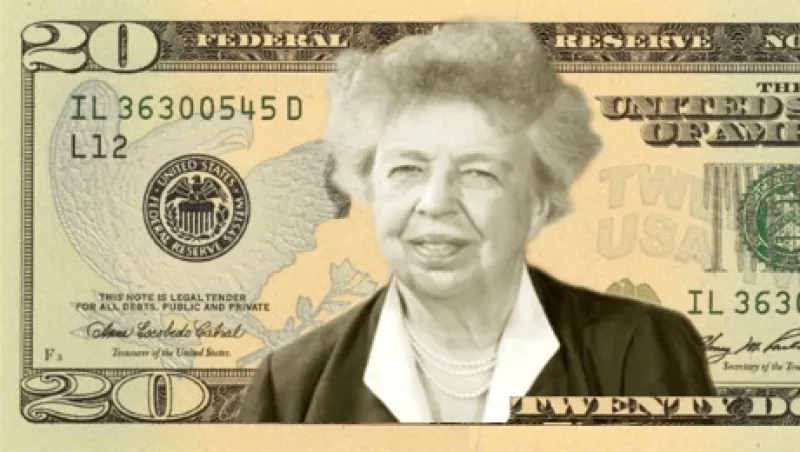The U.S. dollar might be at all-time highs versus other developed-markets currencies, but one small and vocal organization isn’t accepting the tender at face value. Women on 20s, a New York–based advocacy group founded by entrepreneur Barbara Ortiz Howard, has launched a nationwide campaign to get a woman featured on the $20 bill—the first on any denomination of U.S. paper currency—by 2020, the 100th anniversary of women’s suffrage in the U.S.
One reason put forward by Women on 20s to banish Andrew Jackson, seventh president of the U.S. and the bill’s present tenant: He vehemently opposed the idea of central banks, partially on the grounds that it would have given the business-heavy North power over the largely agricultural South. Jackson also signed into law the Indian Removal Act, which led to the forced migration of Native Americans known as the Trail of Tears. Why replace him with a woman? “There are monuments of allegorical women such as the Statue of Liberty, but it’s hard to come by ones of actual women,” notes Susan Ades Stone, a former journalist who is the group’s executive director and strategist.
Women already have been featured on U.S. currency — but only on coins that haven’t retained any staying power. Nineteenth-century suffragist Susan B. Anthony was on a U.S. dollar coin that minted from 1979 to 1981 but, because of its similar size, was often confused with the quarter. The U.S. Mint briefly reintroduced the Susan B. Anthony dollar in 1999. Another dollar coin, approved in 1997 and minted every year since 2000 although with sporadic general circulation, features Sacagawea, the guide from the Native American Shoshone group who led explorers Lewis and Clark in their early-1800s expedition across the American West. Neither coin has proven largely popular beyond vending and public transit fare machines. Anthony is in the running in the initial round of Women on 20s’ voting; Sacagawea is not.
Women on 20s developed a short list of 100 candidates after outreach with women’s studies professors and advisers, including Molly MacGregor, the executive director and chairwoman of the National Women’s History Project, and Jill Tietjen, the CEO of the National Women’s Hall of Fame , located in Seneca Falls, New York, considered the birthplace of the women’s rights movement. Together they narrowed the pool of candidates down to 60. From there, the group took what Stone calls a “more methodical system,” ranking candidates on a rubric of their impact, any adversity faced and how many lives were changed by the work of the woman in question. The group then halved the pool and narrowed it down to a final 15 for voting. Among them: environmentalist Rachel Carson, civil rights pioneer Rosa Parks, and former first lady and United Nations delegate Eleanor Roosevelt. The 15 runners-up are featured on the group’s website, WomenOn20s.org; they include Amelia Earhart, the first woman to fly solo across the Atlantic; Harriet Beecher Stowe, the author of Uncle Tom’s Cabin; and Helen Keller, the first blind-deaf person to earn a bachelor’s degree.
Beyond being a historical figure of notable stature, another requirement is that anyone featured on paper money has to be deceased. In 1929, the last time a new person was chosen to be pictured on a denomination of U.S. paper currency, “that was a tall order for women,” Stone notes. The being-dead requirement rules out living people the public has suggested, including talk show host Oprah Winfrey, feminist Gloria Steinem — and pop star Beyoncé, as well as Janet Yellen, first female head of the Federal Reserve, who according to Stone has not come up often as a name.
The public can vote for three choices at WomenOn20s.org; the winners from the first round will go to a second vote, the victor of which will be presented to President Barack Obama for consideration. There is no firm deadline to end the first round of voting, although the group wants to have 100,000 voters by the end of March, Women’s History Month. More than 60,000 have voted so far and, according to Stone, five clear leaders have emerged.
So far, Stone says, the U.S. Department of the Treasury has made no comment, though last summer President Obama voiced support for putting a woman on U.S. paper currency. The Obama administration has committed that any petition with at least 100,000 signers will get executive attention. The move does not require congressional approval. The group could also approach Treasury Secretary Jack Lew directly, although Stone admits that going to Obama will pay back PR dividends.
Get more on banking.
Follow Anne Szustek on Twitter at @the59thStBridge.






